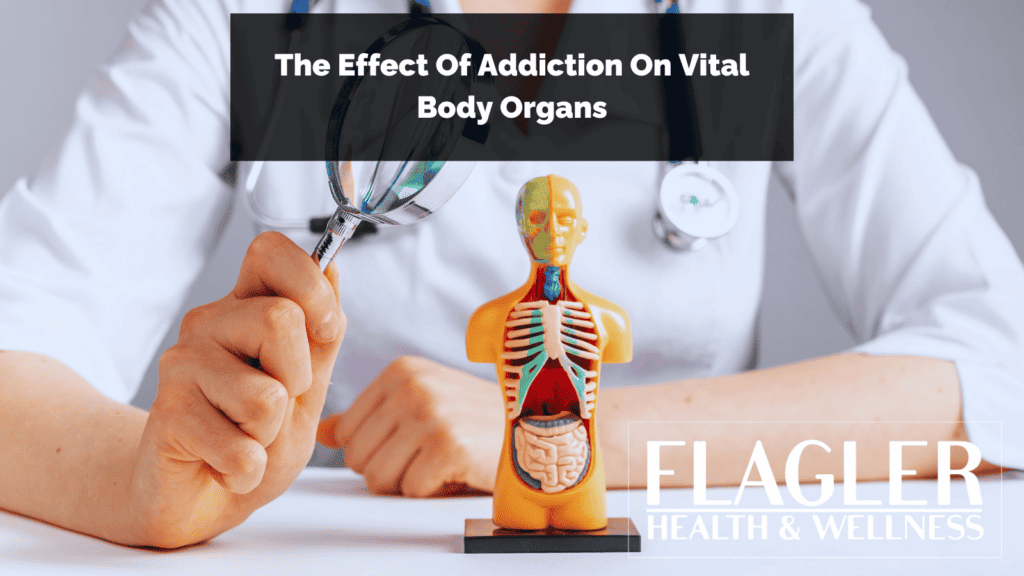Addiction has a profound impact on the body’s vital organs and systems. Substance abuse, whether it involves drugs, alcohol, or both triggers a cascade of detrimental effects that compromise the health and functionality of crucial systems within the body.
Addiction dismantles the body’s equilibrium by altering brain chemistry, increasing the heart’s vulnerability to disease, and increasing the load of toxins that need to be processed by the liver.
Addiction has immediate and long term effects on the body and vital organs, leading to a range of health issues that reduce a person’s quality of life, and in many cases, lead to premature death. While some of these negative effects are obvious and immediate, others are insidious and may develop slowly over time.
Addiction And Its Impact On The Body
Substance abuse and addiction lead to severe physical health problems, affecting nearly every organ in the human body. From the brain to the heart, liver, and kidneys, the damage inflicted by prolonged drug and alcohol abuse is profound and, in some instances, irreversible.
The cardiovascular system, in particular, suffers significantly from the effects of addiction, with substances ranging from nicotine to cocaine posing serious risks to heart health. However, the liver often bears the brunt of the damage from substance use due to its role as the primary processor of toxic substances in the body.
The Effect of Addiction on the Cardiovascular System
Substance abuse has a direct and often detrimental impact on the cardiovascular system. Stimulant drugs like cocaine and methamphetamine can cause immediate effects such as increased heart rate and blood pressure, leading to heightened risks of heart attacks and strokes. Meanwhile, opioids and alcohol have their own set of dangers, including the potential for slowed heart rate, decreased blood pressure, and disruption of the heart’s electrical rhythm.
Immediate and Long-term Effects
Substance use has immediate and long term effects on the body. Some of these effects are obvious and are the result of the high or low caused by using the drug in question. Initially, substance abuse causes acute alterations in heart rate, blood pressure, and brain function, leading to immediate health risks such as overdoses, accidents, and acute organ stress.
With continued drug use over time, more insidious and enduring consequences begin to manifest, including chronic diseases, a weak immune system, irreversible organ damage, and diminished mental health. These effects highlight the pervasive nature of addiction, underlining the critical need for early intervention and sustained support to mitigate the profound impact on the body and ensure a path towards recovery and health restoration.
Effects of Addiction on the Heart
Addiction has a profound effect on the cardiovascular system because it is sensitive and vulnerable to the effects of drug use. Stimulants like cocaine and methamphetamine can cause immediate and severe cardiovascular reactions, including increased heart rate and blood pressure, leading to heightened risks of arrhythmias and acute myocardial infarction.
The American Heart Association notes that long-term substance abuse can also lead to chronic cardiovascular conditions, such as congestive heart failure by promoting the hardening of the arteries, hypertension, and direct damage to the heart muscle. Alcohol, for example, can cause cardiomyopathy, a disorder that affects the heart muscle and its ability to pump blood, leading to heart failure in severe cases.
Effects of Addiction on the Kidneys
Addiction puts an additional strain on the kidneys that can lead to kidney failure. The kidneys’ filter waste from the blood, which becomes more difficult due to the toxic overload from substance use. The National Kidney Foundation highlights that drugs and alcohol cause dehydration and increased blood pressure, two factors that significantly strain kidney function.
Certain substances, such as heroin and prescription opioids, have been linked to acute kidney injury, which can occur rapidly and requires immediate medical attention. Chronic substance abuse also exacerbates the risk of developing chronic kidney disease, a condition characterized by a gradual loss of kidney function over time, potentially leading to the need for dialysis or kidney transplantation.
Effects of Addiction on the Liver: A Primary Victim of Substance Abuse
The liver is a primary victim of substance abuse because it is responsible for metabolizing substances in the body. Conditions such as fatty liver, alcoholic hepatitis, fibrosis, and cirrhosis often develop as a result of chronic substance abuse, leading to significantly impaired liver function and, in severe cases, liver failure. The American Liver Foundation notes that alcohol is one of the most common causes of liver damage.
The impact of substance abuse on the liver underscores the critical need for awareness, early intervention, and treatment strategies aimed at reducing the incidence and progression of liver disease among individuals struggling with addiction. Comprehensive care that includes medical treatment, counseling, and support for cessation of substance use is essential for mitigating the effects of substance abuse on the liver and promoting overall health and well-being.
Immediate and Long-term Effects
The immediate effects of substance abuse on the liver include inflammation and increased liver enzymes, indicators of liver stress or damage. Over time, continued drug abuse may lead to irreversible liver damage, affecting the body’s ability to detoxify substances, metabolize drugs, and process nutrients. This damage not only exacerbates the effects of addiction but also increases the risk of developing liver cancer.
Alcohol-related liver disease (ARLD) progresses through several stages, starting with fatty liver (steatosis), where fat builds up in the liver cells. The most advanced stage of alcohol-related liver disease is cirrhosis, where the liver is significantly scarred and permanently damaged. Cirrhosis significantly impairs liver function, affecting its ability to detoxify the blood, metabolize drugs, and process nutrients.
Certain prescription medications and illegal substances like heroin and methamphetamine also pose significant risks to liver health.
Effects of Addiction on the Brain
Addiction has a profound impact on the brain because it fundamentally alters its structure, brain chemistry and functionality by changing the balance of neurotransmitters and neural pathways in the brain.
These changes can lead to a dependency that ensnares individuals in a cycle of substance abuse, significantly affecting cognitive and emotional well-being. According to the National Institute on Drug Abuse (NIDA), substances of abuse can hijack the brain’s reward system, leading to the release of excessively high levels of dopamine, a feel good neurotransmitter associated with pleasure and reward.
Over time, the brain adapts to these surges of dopamine, reducing the sensitivity of the reward circuit and diminishing the user’s ability to feel pleasure from anything besides the drug. This alteration not only fosters dependency but can also lead to a host of cognitive issues, including problems with memory, attention, decision-making, and impulse control. Addiction also exacerbates cardiovascular risks by impairing the brain’s ability to regulate stress and heart rate, increasing the likelihood of cardiovascular problems.
How We Can Help You
No matter what challenge you are facing, recognizing the need for help is the first step on the road to recovery. The second is to find the right treatment program for your needs. At Flagler, we offer specialized programs that are tailored to an individual’s needs, ensuring the highest chance of your success. Remember, seeking help is not a sign of weakness, but rather one of strength and self-awareness. Reach out to us today to see how we can help you on your journey to a brighter, substance-free future.
Share This Post







